- Home
- Anders de la Motte
Rites of Spring
Rites of Spring Read online
To all my readers,
because you allow me to have the best job in the world
April is the cruellest month, breeding
Lilacs out of the dead land, mixing
Memory and desire, stirring
Dull roots with spring rain.
T S Eliot: ‘The Waste Land’
Contents
Prologue
Chapter 1
Chapter 2
Chapter 3
Chapter 4
Chapter 5
Chapter 6
Chapter 7
Chapter 8
Chapter 9
Chapter 10
Chapter 11
Chapter 12
Chapter 13
Chapter 14
Chapter 15
Chapter 16
Chapter 17
Chapter 18
Chapter 19
Chapter 20
Chapter 21
Chapter 22
Chapter 23
Chapter 24
Chapter 25
Chapter 26
Chapter 27
Chapter 28
Chapter 29
Chapter 30
Chapter 31
Chapter 32
Chapter 33
Chapter 34
Chapter 35
Chapter 36
Chapter 37
Chapter 38
Chapter 39
Chapter 40
Chapter 41
Chapter 42
Chapter 43
Chapter 44
Chapter 45
Chapter 46
Chapter 47
Chapter 48
Chapter 49
Chapter 50
Chapter 51
Chapter 52
Chapter 53
Chapter 54
Chapter 55
Chapter 56
Chapter 57
Chapter 58
Chapter 59
Chapter 60
Chapter 61
Chapter 62
Chapter 63
Chapter 64
Chapter 65
Chapter 66
Chapter 67
Chapter 68
Chapter 69
Chapter 70
Chapter 71
Chapter 72
Chapter 73
Chapter 74
Chapter 75
Chapter 76
Chapter 77
Chapter 78
Chapter 79
Chapter 80
Chapter 81
Chapter 82
Chapter 83
Chapter 84
Chapter 85
Chapter 86
Chapter 87
Chapter 88
Chapter 89
Chapter 90
Chapter 91
Chapter 92
Epilogue
Author’s note
Extract from End of Summer
About the Author
Copyright
Prologue
19 May 1986
A
s soon as Little Stefan drove onto the marsh, he began to think about the dead girl. It was impossible not to. The game of Chinese whispers that had started on the morning of May the first had already travelled around the area several times. Filled his head with horrific images from which there was no escape.
Her lifeless body on the sacrificial stone in the centre of the stone circle. Her white dress, her hair loose around her head. Her hands folded over her chest, two antlers clasped in her stiff fingers. Her once beautiful face covered by a bloodstained handkerchief, as if whoever had taken her life had been unable to look her in the eye afterwards.
Most Tornaby residents were already absolutely certain that they knew who’d killed her, that the whole thing was a dreadful but simple story. A family tragedy. However, there were those who quietly maintained that something else entirely had happened during Walpurgis Night. That maybe it was the Green Man himself who had claimed his spring sacrifice.
It had been a long time since Little Stefan had believed in ghost stories, but he couldn’t help shuddering. The marshy forest closed in around the dirt track, scraping at the paintwork with long, green fingers. This was the part of the castle estate he disliked most of all. The dampness, the smell of decay. The sodden ground that at one moment felt solid, at the next sucked your boots so deep into the mud that it was a real struggle to escape without help. The marsh belongs to the Green Man, his grandfather used to say. People ought to stay away. At least the superstitious old misery guts had been partly right.
The track led deep into the marsh, to Svartgården, where the girl had lived. Only a month or so ago he’d given her a lift to the bus stop. She’d sat right next to him in the front seat of the pick-up. She hadn’t said much; she’d seemed lost in her own thoughts. He’d stolen glances at her from time to time, watching her face, her movements, and out of nowhere he’d been overwhelmed by a feeling he couldn’t explain.
He was married, he had two young daughters, a house, a car, a good job. Things he usually valued, but at that moment, sitting beside that beautiful girl, they had felt like a burden. His whole life was already mapped out, one long, predictable journey without an ounce of the tempting, forbidden pleasures that emanated from her. He could smell it on her – sweet and sharp like newly opened lilac blossom. A perfume that evoked yearning. Desire.
At one point when she looked away, he’d almost reached out to touch her, as if that would enable him to access everything he didn’t have. He’d stopped himself at the last second, but the sense of loss had lingered for several days.
He had to concentrate in order to avoid the deepest potholes the further on he drove. Lasse Svart was supposed to maintain the track, according to his lease, but needless to say he didn’t bother. For years Lasse Svart had relied on the fact that the count would never be able to find another tenant; nobody was interested in a dozen or so acres of sodden forest, so he more or less did what he liked out at Svartgården. His own little kingdom, far away from laws, rules, and curious eyes.
But that was before Walpurgis Night. Before Lasse’s sixteen-year-old daughter was found dead on the sacrificial stone, the ground all around ploughed up by hooves.
During Walpurgis Night the veil between life and death is at its thinnest. Things are on the move, nature is hungry and the Green Man rides through the forest.
Little Stefan suppressed another shudder.
The forest opened out as he reached the muddy yard surrounding Svartgården. Three dilapidated buildings huddled in the gloom beneath the trees, as if they were trying to hide. Rusty agricultural tools and machinery lay among the nettles.
He’d been here many times before, usually with Erik Nyberg, the castle administrator, and they’d always been met by a pack of yapping terriers before he’d even switched off the engine. Today there wasn’t a dog in sight. The place was quiet; even the birds weren’t making much noise on this spring morning. A strange, oppressive silence filled the air.
Little Stefan remained standing by his truck for a minute or so as he tucked a plug of tobacco beneath his top lip and waited for Lasse or one of his women to poke their head out of the door and ask what the fuck he wanted, but nothing happened. Lasse’s red pick-up was nowhere to be seen, nor was the battered old Ford the women usually drove. He glanced at his watch: seven thirty. Who went out at this early hour?
He caught a movement out of the corner of his eye. A small dog was peering around the corner of the smithy; it was little more than a puppy.
‘Hello! Come on then,’ Little Stefan said, without really knowing why. The dog took a couple of cautious steps, keeping its belly low, tail tucked between its legs. Then it suddenly stopped and stiffened, as i
f it had heard something.
Little Stefan turned his head, but the house was still in darkness. When he looked back, the dog was gone.
He set off up the concrete steps leading to the front door; halfway up he realised it was ajar. He paused, unsure of what to do. On the wall next to the door he saw a half-metre-tall figure woven from fresh green branches. His grandfather had made one every spring and hung it on the front door.
So that the Green Man will ride on through the night. So that he won’t stop at our house.
‘Hello? Anyone home?’
The words bounced off the walls and came back like a distorted echo, as if it were someone else’s voice. Someone who was watching him from the darkness. Imitating him, mocking him.
Little Stefan looked at the creepy figure again, and for a second he was ready to run back down the steps, jump in his truck and get out of there. Tell Erik Nyberg that no one had been home, and reading the water meter would have to wait. However, he was a grown man with a job to do, not some little kid who was scared of ghosts.
He knocked on the door frame.
‘Hello?’ he shouted again. ‘Anyone home? It’s Little Stefan, from the castle.’
No response.
The silence from inside the house was making him increasingly uncomfortable. His shirt was sticking to his back. He took a deep breath and knocked once more, harder this time. Pushed the door open and stepped into the porch. There was a weird smell, a stale odour that reminded him of animals – but what was it?
‘Hello?’
He checked out the kitchen. The table was littered with dirty plates, glasses and cutlery for three people. Several flies were buzzing around among the remains of the food. One of the chairs had been knocked over. Through a doorway on the other side of the porch he could just see a neatly made bed.
‘Hello!’ This time he yelled up the stairs.
Still nothing. He was feeling very uneasy now, but he pulled himself together and made his way up the creaking wooden staircase.
The upper floor was in darkness. On the left was a bedroom with a double bed, also neatly made. The door on the right was closed. It took him a few seconds to realise that it wasn’t simply a uniform green, but was covered in a carefully painted pattern of leaves. Almost a work of art, in fact.
Elita’s Room, someone had written in attractive, ornate lettering at eye level.
So this was her room. This was where she had lived her life.
Elita Svart. The spring sacrifice.
Little Stefan reached for the handle; his heartbeat seemed to be reverberating throughout the house. He was on the point of doing something forbidden, stepping into a world to which he was not permitted access. An uninvited guest, an intruder.
Then he saw another message on the door. Small, distorted words that almost blended in with the artwork, but became clearer as his eyes grew used to the darkness.
Nature is hungry and the Green Man is riding through the forests.
At the same time he spotted something else. Hidden among the leaves there was a large, terrifying male face.
The realisation was sudden, and chilled his blood. He didn’t know where it had come from or why, but the sensation was so strong that it made the hairs on the back of his neck stand on end. Something had happened in this house. Something evil that had made Lasse Svart and his women leap to their feet in the middle of their supper, run out to their cars and drive away in the night. Something connected to a dead sixteen-year-old girl on a cold stone, and a ghostly rider galloping through the forest.
Little Stefan let go of the door handle and took the stairs in three strides. Hurtled out through the porch, down the steps and into his truck.
He started the engine and set off with a screech of tyres. He didn’t even glance in the rear-view mirror until he was absolutely certain that Svartgården had disappeared, deep among the trees.
1
‘Hi, Margaux, it’s Thea. Sorry I haven’t called you for a while – there’s been a lot to do with the move, but now David and I have arrived in Skåne. Our new life can begin. A new, happier story than the old one. At least that’s what both of us are hoping for.’
T
he drone begins by taking a close-up of the main entrance and the impressive stone steps, then it slowly pulls out until the whole castle can be seen: a large central section with two wings, which from above makes the building look like an elongated H.
The white, freshly cleaned façade, the green copper roof, the coach house and the stables a short distance away to the right, beyond the east wing. The moat beyond the west wing. Then the voiceover.
‘Bokelund Castle is situated approximately four kilometres from the small community of Tornaby in the district of Ljungslöv in north-western Skåne, not far from the southern point of Söderåsen National Park. The castle is one of the oldest in Skåne, dating all the way back to the fourteenth century. The current main building, in the style of the French Renaissance, was constructed around 1880, but remains of the original castle can still be found down in the cellar, where one of the dungeons still exists.’
A slight exaggeration. No one actually knows what the little vaulted room down in the cellar was used for, but Thea has to admit that David was right when he said that a dungeon sounded better than a larder.
The camera zooms a little further out, revealing the mossy green moat. The avenue linking the castle to the main road in the south. The narrow stone bridge leading across to the forest in the north. The marsh, just visible to the east.
‘Bokelund Castle lies on an island surrounded by a moat, created in the seventeenth century by diverting water from the nearby Tornaby marsh, which is one of Skåne’s largest wetlands. It is also a Natura-2000 area, supporting a wide range of flora and fauna.’
Switch to a shot of deer with the light behind them, ferns, moss, a dragonfly dancing over a tranquil pool, a skein of geese crossing a blue sky.
Back to the drone. A new angle, this time a variation on the opening image, finishing at the top of the stone steps where she and David are now standing.
‘Since 1996 the castle has been owned and run by the Bokelund Foundation, which was started by Count Rudolf Gordon, the last private owner. The foundation is unique; its aim is to benefit the Tornaby area and its residents. Among other things, it funds a bus service and a local medical practice, and also awards grants. The castle has recently been restored to its former glory.’
End.
‘What do you think?’ David looks both eager and nervous at the same time. ‘They’ll add the interview we’re about to do.’
‘Great,’ Thea says, and immediately regrets her choice of word when she sees his expression. ‘Professional,’ she adds. ‘Extremely professional.’
David looks happier. He closes his laptop and places it on the stone balustrade.
‘The producer just sent it to me.’ He points to the short man in the baseball cap who’s standing a short distance away, talking to the cameraman and the sound guy. ‘There’s a bit of tweaking to do, plus the music track, but they’ll put that on after the interview. I think it’s going to be fantastic – as long as the weather holds out.’
He glances anxiously at the sky. It’s warm for the second half of April, and the spring sun is shining, but a band of grey has begun to grow on the horizon.
‘This has to be perfect,’ he mutters, probably as much to himself as to Thea.
She places a hand on his arm. ‘It will be. Don’t worry.’
David nods, forces a wry smile. He’s wearing spotless chef’s whites. His beard, peppered with grey, has been neatly trimmed along his jaw line, and his blond hair is neatly slicked back.
A woman with a make-up kit attached to her belt comes up to them.
‘Hi – can I just powder your forehead?’
‘Sure, no problem.’
The make-up artist is around thirty, a good fifteen years younger than both Thea and David. She’s also very attractive. Not so long ago D
avid would already have switched on the charm, given her the confident, wolfish grin that’s so difficult to resist. But David is not his usual self. From time to time he nibbles, apparently unconsciously, at one thumbnail; the flesh around it is red, and the make-up artist has to work hard to disguise the sheen of sweat on his forehead.
She turns to Thea.
‘Are you appearing on screen?’
‘No,’ David answers for her. ‘My wife is a little shy.’ He winks at Thea as if to reassure her that everything is OK, that there will be no more arguments; he respects the fact that she doesn’t want to appear on TV. Thea knows it isn’t true.
‘David, can I have a word?’ the producer calls out.
Thea moves over to the wall. She would really like to slink down the stairs, sneak off home to the coach house, stay as far away from the camera as possible, but the TV feature is a big deal for the castle. At the very least she has to stay around and look interested.
‘How’s it going?’ says a voice behind her.
‘Fine.’ Thea tries to hide her surprise. In spite of her height, David’s mother has an unfailing ability to materialise unexpectedly. Ingrid is tall – taller than Thea. Straight back, broad shoulders, no hint of the stooping posture that often creeps in after retirement. Her steel-grey hair is cut short, her eyes sharp behind her glasses.
‘The weather looks promising – that’s good.’
Thea nods in agreement.
‘What time is Dr Andersson arriving tomorrow?’ A quick change of subject. That’s how Ingrid operates.
‘Nine o’clock,’ Thea replies, even though she’s absolutely certain that Ingrid knows exactly what her timetable is.
‘And she’s going to take you around the area. Show you the surgery, explain how everything works.’
Statements, not question.
‘Mm.’
‘Sigbritt Andersson is an excellent GP,’ her mother-in-law continues. ‘She’s meant a lot to Tornaby.’
Thea waits for the reservation that is hanging in the air. And here it is, right on cue.
‘But Sigbritt has always been nosy, ever since she was a child. You have to think about what you say in her company, if you know what I mean. Particularly when it comes to personal matters.’
Ingrid pauses for a couple of seconds – just long enough for another abrupt change of subject.

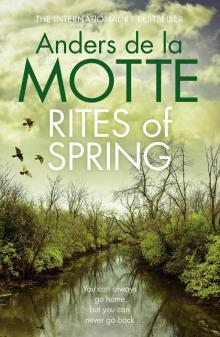 Rites of Spring
Rites of Spring Game: A Thriller
Game: A Thriller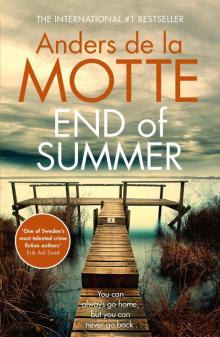 End of Summer
End of Summer Buzz: A Thriller
Buzz: A Thriller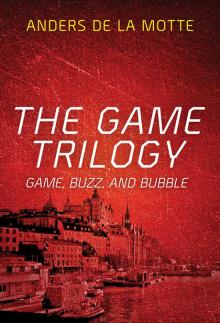 The Game Trilogy
The Game Trilogy Bubble: A Thriller
Bubble: A Thriller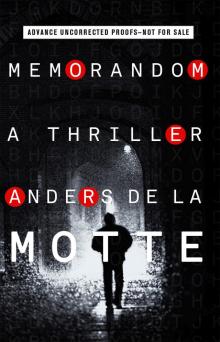 MemoRandom
MemoRandom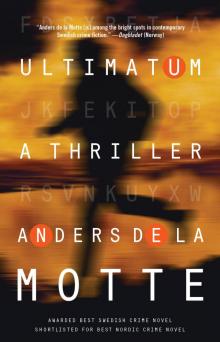 Ultimatum
Ultimatum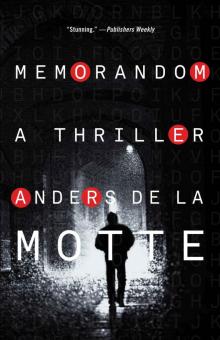 MemoRandom: A Thriller
MemoRandom: A Thriller